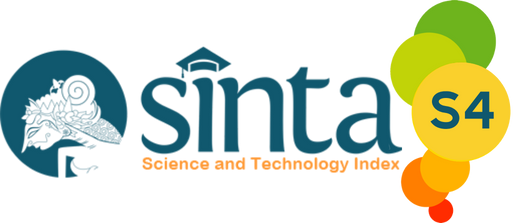Technology-Based Learning Models and Project-Based Learning Models Work Together to Boost Student Motivation and Abilities
Abstract
The modern industrial era demands more practical and innovative skills from school graduates. As a result, there is a need for educational reform that emphasizes helping students acquire competencies relevant to the demands of the labor market. Technology-based learning (TBL) and project-based learning (PjBL) are two learning strategies that could increase student motivation and proficiency. PjBL offers a project-based learning environment where students can gain knowledge through hands-on experiences closely linked to the business world. TBL provides access to tools, resources, and digital platforms that can enrich learning, increase student engagement, and facilitate wider access to information. An observational method was combined with a qualitative approach in this study. The research sample involved were students at the Vocational High School (SMK) level. The research data were obtained through direct observation of the learning process and student activities. The data were analyzed qualitatively descriptively to explore how integrating PjBL and TBL models can improve student motivation and competence. The study's findings demonstrated that by providing students with more engaging, useful, and pertinent learning material, the integration of PjBL and TBL models can boost their motivation to learn. In addition, active involvement in projects and the use of technology increased students' critical thinking skills, creativity, and ability to adapt to a dynamic work environment. The results of this study suggest that combining TBL and PjBL models could be a useful strategy for encouraging students to learn and develop the skills required in today's industrialized society. Combining these two models into instructional strategies promotes deeper student engagement and equips students with skills that will meet industry demands in the future
Keywords
Full Text:
PDFReferences
Budiman, M. A. (2022). Pengaruh model pembelajaran berbasis masalah terhadap motivasi belajar dan kompetensi siswa. JIPTEK: Jurnal Inovasi Pendidikan dan Teknologi, 6(2), 19-24. https://doi.org/10.54371/jiepp.v2i1.131
Fitriana, E. (2020). Analisis Faktor-Faktor yang Mempengaruhi Kompetensi Siswa SMP dalam Pembelajaran Matematika. JIPTEK (Jurnal Ilmiah Pendidikan Teknologi), 3(1), 45-54.https://doi.org/10.31932/j-pimat.v3i1.1129
Jayanti, T. D. (2019). Hubungan Motivasi Belajar dan Persistensi Belajar dengan Prestasi Belajar Mahasiswa Akuntansi Universitas Sebelas Maret. IJIe (Indonesian Journal of Islamic Education), 4(2), 215-226. https://doi.org/10.32672/makma.v2i2.1298
Purwanto, D. (2021). Karakteristik Siswa Berkompetensi Tinggi dan Implikasinya terhadap Pembelajaran. Jurnal Pendidikan Karakter, 13(1), 7-14. https://doi.org/10.57113/taz.v1i1.18
Rahmawati, N. (2022). Pengaruh Penerapan Model Pembelajaran Project Based Learning (PjBL) terhadap Hasil Belajar dan Motivasi Belajar Siswa pada Mata Pelajaran Biologi. Indonesian Journal of Informatics Education, 17(2), 203-212. https://doi.org/10.24114/jevte.v2i1.35883
Rosalina, R. (2021). Penerapan Model Pembelajaran Project-Based Learning untuk Meningkatkan Motivasi dan Hasil Belajar Siswa SMA Negeri 2 Yogyakarta. Jurnal Pendidikan dan Inovasi, 7(1), 53-64. https://doi.org/10.30596/jppp.v2i1.6533
Sadiman, A. S., & Rahardjo, D. (2022). Pembelajaran Berbasis Proyek: Sebuah Pendekatan Pembelajaran Inovatif untuk Meningkatkan Keterampilan Abad ke-21 Siswa. Jurnal Pendidikan Inovatif, 4(2), 145-156. https://doi.org/10.53682/jpeunima.v4i2s.8106
Supriadi, D. (2021). Pengaruh Model Pembelajaran Discovery Learning terhadap Motivasi dan Kompetensi Belajar Siswa SD Negeri 3 Yogyakarta. Jurnal Ilmiah Pendidikan Guru Sekolah Dasar, 5(2), 117-128. https://doi.org/10.36232/jurnalpendidikandasar.v3i2.1134
Supriyanto. (2023). Implementasi Kurikulum Baru: Makna dan Interpretasi Guru. Jurnal Pendidikan dan Kebudayaan, 23(1), 1-15. https://doi.org/10.38035/jpkn.v1i1.111
Sutopo, B. (2022). Penerapan Pembelajaran Berbasis Teknologi untuk Meningkatkan Motivasi Belajar Siswa. Jurnal Pendidikan dan Pembelajaran, 11(2), 11-20. https://doi.org/10.56393/pelita.v2i1.1531
Sutrisno, B. (2022). Implementasi Model Pembelajaran Berbasis Proyek untuk Meningkatkan Keterampilan Berpikir Kritis dan Keterampilan Hidup Siswa SMK. Journal of Vocational and Innovative Education, 8(2), 145-154. https://doi.org/10.25078/aw.v8i2.3069
Warsono, H. (2021). Pembelajaran Berbasis Teknologi Informasi dan Komunikasi (TIK) untuk Meningkatkan Kualitas Pembelajaran di Era Digital. Jurnal Pendidikan dan Pembelajaran, 8(1), 1-10. https://doi.org/10.51903/jtikp.v10i1.138
Wulandari, D. (2022). Penerapan Model Pembelajaran Kooperatif Tipe Jigsaw untuk Meningkatkan Motivasi dan Hasil Belajar Siswa SMA Negeri 2 Semarang. Jurnal Pendidikan dan Inovasi, 8(2), 153-164. https://doi.org/10.56393/lucerna.v2i2.994
Wulandari, D. (2023). Penerapan Model Pembelajaran Kooperatif Tipe Jigsaw untuk Meningkatkan Motivasi dan Hasil Belajar Siswa SMA Negeri 2 Semarang. Jurnal Pendidikan dan Inovasi, 8(2), 153-164. https://doi.org/10.51878/science.v2i3.1548
Wulandari, R., & Susanto, A. (2022). Model Pembelajaran Berbasis Teknologi untuk Meningkatkan Kreativitas dan Motivasi Belajar Siswa SD. Jurnal Pendidikan Inovatif, 4(2), 1-12. https://doi.org/10.56393/lucerna.v2i1.1541
Refbacks
- There are currently no refbacks.








